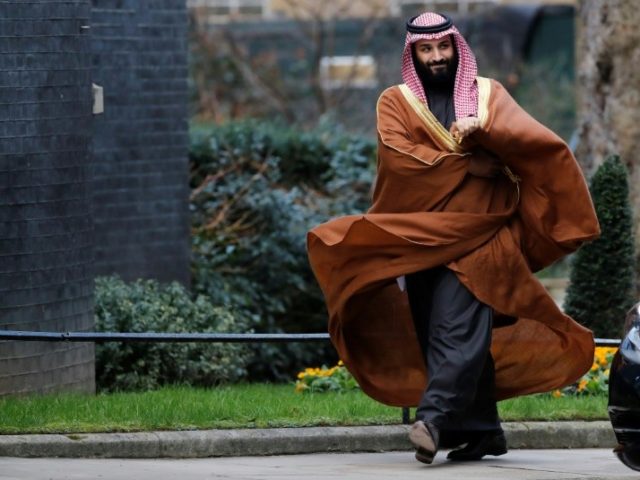Extremist Islamic groups in the Middle East come and go. When they go — as has the Islamic State (ISIS) — the regional void left quickly fills. Most often, and usually through proxies, the “filler” is Iran.
Its leaders have forewarned us of their goals: initial rule of the region; ultimate rule of an Islamic-dominated world.
A recent Middle East trip by Senator Lindsey Graham (R-SC) confirmed for him that Tehran is not idly boasting. And the upcoming U.S. visit by Saudi Arabia’s Crown Prince Mohammed bin Salman (MBS), 32, suggests Graham is not alone in concerns about Iranian mullahs’ increasingly long reach.
Graham criticizes both President Barack Obama and President Donald Trump for creating an environment favorable to Iranian manipulation. While Obama spent eight years playing nice with the mullahs, suggesting other regional players learn to “share the neighborhood” and opening doors for ISIS, Tehran made significant advances. Though Trump recognizes the mullahs’ objectives, Graham fears a coherent strategy for combating Iran’s growing influence in post-ISIS Iraq and Syria is lacking. Meanwhile, Iran — obviously helped by Obama’s nuclear deal giving it billions of dollars in cash — helps fund its proxies: Hezbollah in Lebanon for a war with Israel and Houthi rebels in Yemen — where Saudi military involvement seeks to contain them.
This year, the U.S.-Saudi Arabia alliance turns 75 years old — representing a period of ups and downs. But whenever both nations perceived a common threat — such as Iraq’s Saddam Hussein, leading to the Persian Gulf War — they united to successfully end it. The Saudis helped form an Arab coalition to support U.S. efforts to free Kuwait, pursuant to a UN resolution, when Hussein refused to withdraw after invading in 1990. A 40-day air bombardment followed by a four-day ground war generated a decisive coalition victory.
As important as the U.S.-Saudi alliance was then, the stakes are even greater now to meet the common threat Iran presents. The strategy Trump and MBS map out for the next three (and possibly seven) years will determine whether Obama’s mandate to share the neighborhood allows Tehran to command it.
We should not take the mullahs’ threats as bluster. They came dangerously close, under Iranian President Mahmoud Ahmadinejad, in making them a reality. So convinced was Ahmadinejad he could deliver on them, he commissioned a film production explaining how Tehran was paving the way for the Mahdi’s descent from a state of occultation to lead Iran to world domination — precipitated by mullah-created global nuclear chaos.
The Mahdi eschatology drives regional tensions today, fueled by opposing sectarian beliefs between Sunnis (championed by Saudi Arabia) and Shiites (championed by Iran) on Mahdi’s role.
Ahmadinejad’s film mapped out Israel’s defeat and Iran’s takeover of the Saudi role as protector of Islam’s two holiest sites, Medina and Mecca, in Saudi Arabia. Fortunately, Ahmadinejad’s timetable was disrupted by Stuxnet — believed to have been jointly developed (by U.S. and Israel) malware, setting back Iran’s nuclear program several years.
Ahmadinejad is no longer a player in Iran’s world domination effort, but others are. Only a coordinated Trump-MBS strategy to contain Iranian expansionism and Tehran’s emerging nuclear capability will prevent its emergence as the neighborhood bully.
While Obama hosted members of the anti-U.S. Muslim Brotherhood at the White House — a group whose now-revealed plan is to undermine the U.S. Constitution and our laws — on March 20, Trump will host the pro-U.S. MBS, a leader recognizing his country’s fate in the region, like America’s, is tied to containing Tehran.
As Crown Prince, MBS is a wave-maker. He recently shocked his countrymen by arresting hundreds of businessmen in an anti-corruption campaign. A similar U.S. campaign would certainly have worried Hillary Clinton, as no Saudi was immune from arrest, including royal family members. Many were held for months, under less-than-transparent conditions, until they gave back their allegedly illegally gained wealth. Claims, denied by Riyadh, of coercion and abuse based on reported arrestee injuries must be weighed against the fact those arrested were held in five-star hotels. Even the previous king’s children were forced to surrender inheritances. It is estimated MBS’s effort squeezed out settlements totaling $106 billion dollars.
On the human rights side, MBS has also been active, marginally leveling the playing field for women, promising gender reforms such as allowing women to drive. These campaigns seek to demonstrate the country is moving in the right direction, showing citizens the old corrupt ways are unacceptable and foreigners a more positive investment environment. However, the latter, while glad to see endemic corruption end, are concerned over the extra-judicial method of doing it. But Saudi elites are now on notice, like the old Smith Barney ad suggested, that they must make money the old-fashioned way: by earning it. Arguably, these reforms are minimal, but even the camel needs to get its nose under the tent as a start. While the Saudis’ human rights compass clearly seeks a course change, any final dramatic shift will take an entire MBS lifetime.
And the length of that lifetime may have been endangered by a most courageous act undertaken by MBS while visiting Egypt earlier this month. He requested to meet personally with the Coptic Church pope — a Christian group religiously persecuted by Muslims in Egypt and elsewhere. For an earlier Muslim leader’s courageous act in reaching out to non-Muslims — Egyptian President Anwar Sadat who signed a peace treaty with Israel in 1979 — the reward from infuriated Islamists was assassination two years later.
There is a wide range of complex issues Trump and MBS need to discuss including: Iran, Hezbollah, Yemen, Qatar, the Palestinian Authority, Hamas, etc. But also of import is the quietly shifting relationship between Saudi Arabia and Israel.

COMMENTS
Please let us know if you're having issues with commenting.